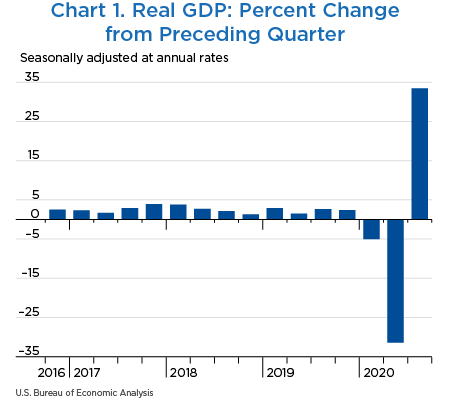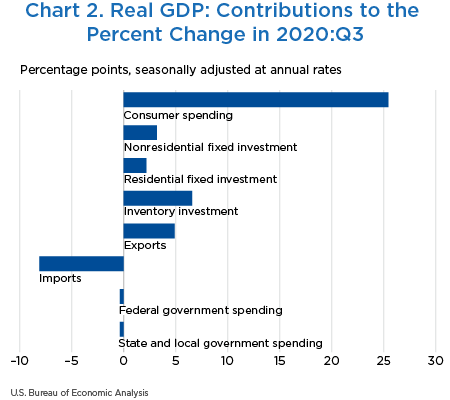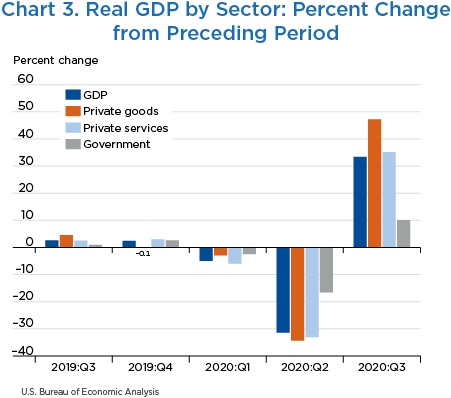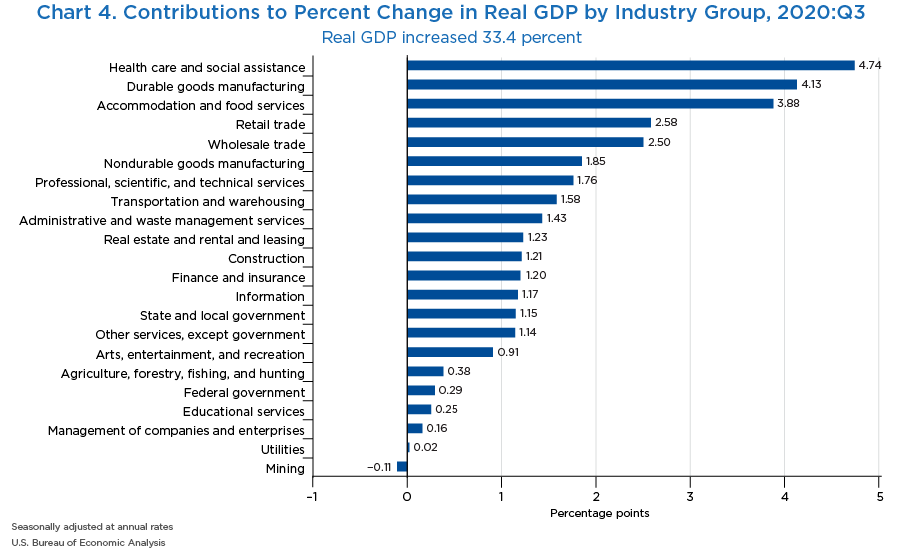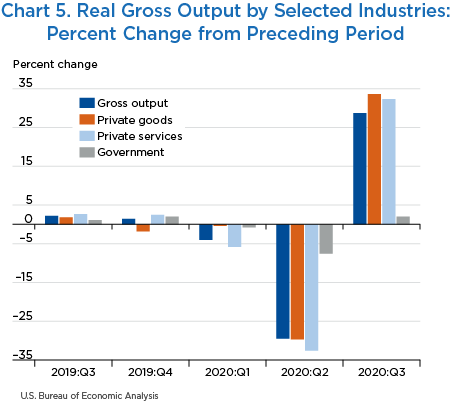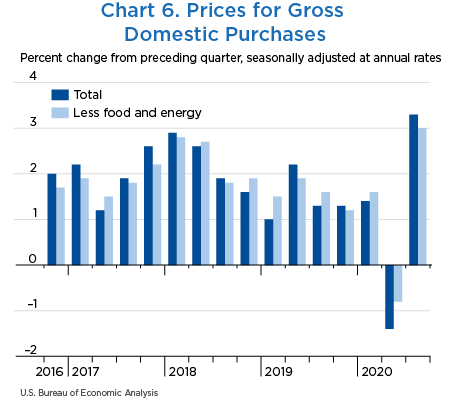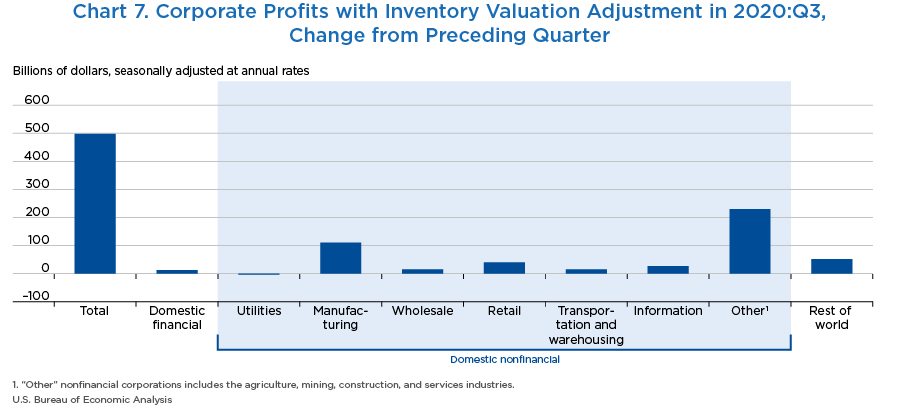GDP and the Economy
Third Estimates for the Third Quarter of 2020
Real gross domestic product (GDP) increased at an annual rate of 33.4 percent in the third quarter of 2020, according to the third estimates of the National Income and Product Accounts (NIPAs) (chart 1 and table 1).1 With the third estimate, real GDP growth was revised up 0.3 percentage point from the second estimate issued last month. In the second quarter of 2020, real GDP decreased 31.4 percent.
The increase in real GDP in the third quarter reflected increases in consumer spending, inventory investment, exports, nonresidential fixed investment, and residential fixed investment that were partly offset by decreases in federal government spending and state and local government spending.2 Imports, which are a subtraction in the calculation of GDP, increased (chart 2 and table 1).
Except for federal government spending, all GDP components contributed to the upturn in real GDP in the third quarter. Imports turned up strongly.
- Consumer spending was the main contributor to the upturn in real GDP, reflecting strong upturns in spending on both services and goods.
- The upturns in spending on services were widespread, as “stay-at-home” orders to protect against the spread of COVID-19 eased in many parts of the United States (see “Impact of the Coronavirus (COVID-19) Pandemic on the Third-Quarter 2020 GDP Estimate”). The largest contributors to the upturn were health care (mainly hospitals and outpatient services), food services and accommodations (led by spending on purchased meals and beverages), and recreation services (led by spending on membership clubs, sports centers, parks, theaters, and museums).
- The largest contributors to the upturn in spending on goods were upturns in clothing and footwear, in other durable goods (mainly jewelry and watches as well as therapeutic appliances and equipment), and in gasoline and other energy goods. Spending on motor vehicles and parts (mainly new light trucks) and other nondurable goods accelerated.
- Exports turned up, reflecting upturns in exports of both goods and services.
- The upturn in goods exports primarily reflected upturns in automotive vehicles, engines, and parts and in nonautomotive capital goods.
- A smaller decrease in travel and an upturn in transport services were the leading contributors to the upturn in exports of services.
- Inventory investment turned up, primarily reflecting an upturn in retail trade (led by motor vehicle and parts dealers) that was partly offset by downturns in nondurable goods manufacturing (mainly petroleum and coal product manufacturing and chemical manufacturing).
- Nonresidential fixed investment turned up in the third quarter, primarily reflecting upturns in spending on equipment and intellectual property products. Investment in structures decreased less in the third quarter than in the second quarter.
- The upturn in equipment primarily reflected an upturn in transportation equipment (mainly light trucks).
- The upturn in intellectual property products reflected upturns in research and development and in software investment and a smaller decrease in entertainment, literary, and artistic originals.
- The smaller decrease in structures investment was led by a smaller decrease in mining exploration, shafts, and wells.
- Residential investment turned up, primarily reflecting upturns in other structures (mainly brokers' commissions and other ownership transfer costs) and in new single-family structures.
- State and local government spending decreased less in the third quarter than in the second quarter, primarily reflecting a smaller decrease in consumption expenditures that was more than accounted for by an upturn in employee compensation.
- Federal government spending turned down in the third quarter, reflecting a downturn in nondefense intermediate services purchased, as the costs associated with the processing and administration of Paycheck Protection Program loan applications by banks on behalf of the federal government decreased.
- The upturn in imports reflected upturns in both goods and services, as international trade rebounded in the third quarter after being severely curtailed in the second quarter due to the COVID-19 pandemic.
- The upturn in imports of goods was led by an upturn in imports of automotive vehicles, engines, and parts.
- The upturn in imports of services was led by upturns in both travel and transport services.
Real gross domestic income, which is the sum of incomes earned and costs incurred in the production of GDP, increased 25.8 percent in the third quarter after decreasing 32.6 percent in the second quarter.
| Line | Series | Share of current-dollar GDP (percent) | Change from preceding period (percent) | Contribution to percent change in real GDP (percentage points) | ||||||
|---|---|---|---|---|---|---|---|---|---|---|
| 2020 | 2019 | 2020 | 2019 | 2020 | ||||||
| Q3 | Q4 | Q1 | Q2 | Q3 | Q4 | Q1 | Q2 | Q3 | ||
| 1 | Gross domestic product (GDP)1 | 100.0 | 2.4 | −5.0 | −31.4 | 33.4 | 2.4 | −5.0 | −31.4 | 33.4 |
| 2 | Personal consumption expenditures | 68.0 | 1.6 | −6.9 | −33.2 | 41.0 | 1.07 | −4.75 | −24.01 | 25.44 |
| 3 | Goods | 23.0 | 0.6 | 0.1 | −10.8 | 47.2 | 0.12 | 0.03 | −2.06 | 9.55 |
| 4 | Durable goods | 8.3 | 3.1 | −12.5 | −1.7 | 82.7 | 0.22 | −0.93 | 0.00 | 5.20 |
| 5 | Nondurable goods | 14.7 | −0.7 | 7.1 | −15.0 | 31.1 | −0.10 | 0.97 | −2.05 | 4.35 |
| 6 | Services | 45.0 | 2.0 | −9.8 | −41.8 | 38.0 | 0.96 | −4.78 | −21.95 | 15.89 |
| 7 | Gross private domestic investment | 17.4 | −3.7 | −9.0 | −46.6 | 86.3 | −0.64 | −1.56 | −8.77 | 11.96 |
| 8 | Fixed investment | 17.4 | 1.0 | −1.4 | −29.2 | 31.3 | 0.17 | −0.23 | −5.27 | 5.39 |
| 9 | Nonresidential | 13.2 | −0.3 | −6.7 | −27.2 | 22.9 | −0.04 | −0.91 | −3.67 | 3.20 |
| 10 | Structures | 2.6 | −5.3 | −3.7 | −33.6 | −17.4 | −0.16 | −0.11 | −1.11 | −0.53 |
| 11 | Equipment | 5.7 | −1.7 | −15.2 | −35.9 | 68.2 | −0.10 | −0.91 | −2.03 | 3.26 |
| 12 | Intellectual property products | 4.9 | 4.6 | 2.4 | −11.4 | 8.4 | 0.21 | 0.11 | −0.53 | 0.46 |
| 13 | Residential | 4.3 | 5.8 | 19.0 | −35.6 | 63.0 | 0.22 | 0.68 | −1.60 | 2.19 |
| 14 | Change in private inventories | 0.0 | ...... | ...... | ...... | ...... | −0.82 | −1.34 | −3.50 | 6.57 |
| 15 | Net exports of goods and services | −3.5 | ...... | ...... | ...... | ...... | 1.52 | 1.13 | 0.62 | −3.21 |
| 16 | Exports | 9.8 | 3.4 | −9.5 | −64.4 | 59.6 | 0.39 | −1.12 | −9.51 | 4.89 |
| 17 | Goods | 6.6 | 2.5 | −2.7 | −66.8 | 104.3 | 0.19 | −0.20 | −6.56 | 4.87 |
| 18 | Services | 3.1 | 5.1 | −20.8 | −59.6 | −0.5 | 0.20 | −0.92 | −2.95 | 0.03 |
| 19 | Imports | 13.3 | −7.5 | −15.0 | −54.1 | 93.1 | 1.13 | 2.25 | 10.13 | −8.10 |
| 20 | Goods | 11.2 | −9.4 | −11.4 | −49.6 | 110.2 | 1.15 | 1.36 | 7.32 | −7.67 |
| 21 | Services | 2.0 | 0.9 | −28.5 | −69.9 | 24.9 | −0.03 | 0.90 | 2.80 | −0.43 |
| 22 | Government consumption expenditures and gross investment | 18.0 | 2.4 | 1.3 | 2.5 | −4.8 | 0.42 | 0.22 | 0.77 | −0.75 |
| 23 | Federal | 7.0 | 4.0 | 1.6 | 16.4 | −6.2 | 0.26 | 0.10 | 1.17 | −0.38 |
| 24 | National defense | 4.2 | 6.6 | −0.3 | 3.8 | 3.2 | 0.26 | −0.01 | 0.18 | 0.17 |
| 25 | Nondefense | 2.8 | 0.1 | 4.4 | 37.6 | −18.3 | 0.00 | 0.11 | 0.98 | −0.55 |
| 26 | State and local | 11.0 | 1.5 | 1.1 | −5.4 | −3.9 | 0.16 | 0.12 | −0.40 | −0.37 |
| Addenda: | ||||||||||
| 27 | Gross domestic income (GDI)2 | ...... | 3.3 | −2.5 | −32.6 | 25.8 | ...... | ...... | ...... | ...... |
| 28 | Average of GDP and GDI | ...... | 2.8 | −3.7 | −32.0 | 29.6 | ...... | ...... | ...... | ...... |
| 29 | Final sales of domestic product | ...... | 3.2 | −3.6 | −28.1 | 25.9 | 3.18 | −3.62 | −27.88 | 26.87 |
| 30 | Goods | 31.0 | 3.2 | −3.5 | −29.0 | 62.4 | 0.94 | −0.98 | −7.40 | 17.42 |
| 31 | Services | 60.4 | 2.1 | −7.6 | −32.9 | 23.7 | 1.29 | −4.82 | −21.32 | 14.60 |
| 32 | Structures | 8.6 | 1.5 | 10.3 | −28.4 | 14.9 | 0.13 | 0.85 | −2.66 | 1.42 |
| 33 | Motor vehicle output | 3.0 | −14.6 | −24.7 | −86.9 | 1,133.9 | −0.43 | −0.73 | −3.99 | 5.92 |
- The GDP estimates under the contribution columns are also percent changes.
- GDI is deflated by the implicit price deflator for GDP.
The third estimate of GDP includes estimates of GDP by Industry, or value added—a measure of an industry's contribution to GDP. Private goods-producing industries increased 47.2 percent, private services-producing industries increased 35.1 percent, and government increased 10.1 percent (table 2 and charts 3 and 4). Overall, 21 of 22 industry groups contributed to the third-quarter increase in real GDP.
- Within private goods-producing industries, the leading contributor to the increase was durable goods manufacturing (led by motor vehicles, bodies and trailers, and parts).
- Within private services-producing industries, the leading contributors to the increase were health care and social assistance (led by ambulatory health care), accommodation and food services (led by food services and drinking places), retail trade, and wholesale trade.
- The increase in government reflected increases in both state and local government and federal government.
- Offsetting these increases was a decrease in mining in the third quarter (led by support activities for mining).
| Line | Series | Share of current-dollar GDP (percent) | Change from preceding period (percent) | Contribution to percent change in real GDP (percentage points) | ||||||
|---|---|---|---|---|---|---|---|---|---|---|
| 2020 | 2019 | 2020 | 2019 | 2020 | ||||||
| Q3 | Q4 | Q1 | Q2 | Q3 | Q4 | Q1 | Q2 | Q3 | ||
| 1 | Gross Domestic Product | 100.0 | 2.4 | −5.0 | −31.4 | 33.4 | 2.4 | −5.0 | −31.4 | 33.4 |
| 2 | Private industries | 86.7 | 2.9 | 2.4 | −5.4 | 37.3 | 2.50 | 2.07 | −4.71 | 32.01 |
| 3 | Agriculture, forestry, fishing, and hunting | 0.7 | 4.7 | 3.6 | 28.4 | 53.3 | 0.03 | 0.03 | 0.22 | 0.38 |
| 4 | Mining | 0.7 | 7.7 | −8.2 | −2.2 | −14.4 | 0.16 | −0.10 | −0.03 | −0.11 |
| 5 | Utilities | 1.7 | −7.7 | 22.9 | 8.2 | 0.8 | −0.12 | 0.34 | 0.12 | 0.02 |
| 6 | Construction | 4.4 | 0.4 | 0.3 | 0.6 | 27.4 | 0.00 | 0.00 | 0.02 | 1.21 |
| 7 | Manufacturing | 10.5 | 5.8 | 0.5 | −6.4 | 61.6 | 0.53 | 0.00 | −0.70 | 5.98 |
| 8 | Durable goods | 5.9 | 0.1 | 2.6 | −5.9 | 80.3 | 0.00 | 0.15 | −0.36 | 4.13 |
| 9 | Nondurable Goods | 4.7 | 13.5 | −2.0 | −7.0 | 40.4 | 0.53 | −0.15 | −0.34 | 1.85 |
| 10 | Wholesale trade | 5.7 | −0.5 | −0.5 | −0.2 | 45.3 | 0.06 | 0.01 | −0.01 | 2.50 |
| 11 | Retail trade | 5.6 | 4.3 | 2.7 | −7.0 | 46.9 | 0.21 | 0.14 | −0.39 | 2.58 |
| 12 | Transporation and warehousing | 2.7 | 6.9 | 2.1 | −9.6 | 65.4 | 0.22 | 0.07 | −0.32 | 1.58 |
| 13 | Information | 5.7 | 7.1 | 7.3 | −2.9 | 19.7 | 0.37 | 0.38 | −0.15 | 1.17 |
| 14 | Finance, insurance, real estate, rental, and leasing | 23.4 | −0.3 | 3.5 | −5.2 | 9.6 | −0.09 | 0.74 | −1.12 | 2.43 |
| 15 | Finance and insurance | 8.7 | −4.6 | 7.6 | −12.9 | 12.8 | −0.37 | 0.59 | −1.04 | 1.20 |
| 16 | Real estate and rental and leasing | 14.7 | 2.2 | 1.1 | −0.6 | 7.7 | 0.29 | 0.15 | −0.08 | 1.23 |
| 17 | Professional and business services | 12.9 | 5.1 | 3.1 | −1.9 | 25.5 | 0.63 | 0.39 | −0.24 | 3.35 |
| 18 | Professional, scientific, and technical services | 7.9 | 6.8 | 3.1 | −1.0 | 21.6 | 0.53 | 0.24 | −0.08 | 1.76 |
| 19 | Management of companies and enterprises | 2.0 | 1.4 | 4.3 | −3.8 | 7.5 | 0.02 | 0.08 | −0.07 | 0.16 |
| 20 | Administrative and waste management services | 3.0 | 3.2 | 2.4 | −2.8 | 50.6 | 0.09 | 0.07 | −0.09 | 1.43 |
| 21 | Educational services, health care, and social assistance | 8.3 | 2.3 | 2.3 | −6.7 | 65.6 | 0.17 | 0.19 | −0.59 | 4.99 |
| 22 | Educational services | 1.3 | 3.2 | 2.9 | −3.1 | 19.2 | 0.04 | 0.04 | −0.04 | 0.25 |
| 23 | Health care and social assistance | 7.0 | 2.1 | 2.2 | −7.3 | 75.1 | 0.13 | 0.15 | −0.55 | 4.74 |
| 24 | Arts, entertainment, recreation, accomodation, and food services | 2.4 | 6.6 | −1.7 | −26.2 | 333.5 | 0.27 | −0.08 | −1.23 | 4.79 |
| 25 | Arts, entertainment, and recreation | 0.5 | 7.9 | −1.5 | −26.2 | 293.1 | 0.09 | −0.02 | −0.32 | 0.91 |
| 26 | Accommodation and food services | 1.9 | 6.1 | −1.8 | −26.3 | 344.5 | 0.18 | −0.06 | −0.91 | 3.88 |
| 27 | Other services, except government | 1.9 | 2.6 | −1.7 | −13.4 | 65.6 | 0.05 | −0.04 | −0.30 | 1.14 |
| 28 | Government | 13.3 | 0.9 | 2.6 | −2.5 | 10.1 | 0.14 | 0.34 | −0.30 | 1.44 |
| 29 | Federal | 4.3 | 2.8 | 1.9 | 1.9 | 6.1 | 0.12 | 0.07 | 0.07 | 0.29 |
| 30 | State and local | 9.0 | 0.0 | 3.0 | −4.4 | 12.0 | 0.03 | 0.26 | −0.37 | 1.15 |
| Addenda: | ||||||||||
| 31 | Private goods-producing industries1 | 16.3 | 4.5 | −0.1 | −2.9 | 47.2 | 0.71 | −0.07 | −0.49 | 7.45 |
| 32 | Private services-producing industries2 | 70.4 | 2.5 | 3.0 | −6.0 | 35.1 | 1.79 | 2.15 | −4.23 | 24.55 |
- Consists of agriculture, forestry, fishng and hunting; mining; construction; and manufacturing.
- Consists of utilities; wholesale trade; retail trade; transportation and warehousing; information; finance, insurance, real estate, rental, and leasing; professional and business services; educational services, health care, and social assistance; arts, entertainment, recreation, accommodation, and food services; and other services, except government.
Note. Percent changes are from these GDP by industry tables: “Value Added by Industry as a Percentage of Gross Domestic Product,” “Percent Changes in Chain-Type Quantity Indexes for Value Added by Industry,” and “Contributions to Percent Change in Real Gross Domestic Product by Industry.”
Gross output by industry—principally a measure of an industry's sales or receipts, which includes sales to final users in the economy (GDP by expenditure) and sales to other industries (intermediate inputs)—increased 28.7 percent in the third quarter. Private goods-producing industries increased 33.6 percent, private services-producing industries increased 32.3 percent, and government increased 2.0 percent (table 3 and chart 5). Overall, 19 of 22 industry groups contributed to the increase in real gross output. Mining, federal government, and utilities gross output decreased.
- Within private goods-producing industries, the industry with the largest increase was durable-goods manufacturing.
- Within private services-producing industries, the industries with the largest increases were accommodation and food services and arts, entertainment, and recreation.
- The 2.0 percent increase in real gross output for the government sector reflected a 7.3 percent increase in real gross output for state and local government that was partially offset by an 8.3 percent decrease in real gross output for the federal government.
| Line | Series | Change from preceding period (percent) | ||||
|---|---|---|---|---|---|---|
| 2019 | 2019 | 2020 | ||||
| Q4 | Q1 | Q2 | Q3 | |||
| 1 | All industries1 | 1.8 | 1.4 | −4.0 | −29.5 | 28.7 |
| 2 | Private industries | 1.9 | 1.3 | −4.4 | −31.9 | 32.6 |
| 3 | Agriculture, forestry, fishing, and hunting | −0.1 | 5.2 | 9.2 | −14.3 | 15.9 |
| 4 | Mining | 4.8 | −4.8 | −2.1 | −55.2 | −12.2 |
| 5 | Utilities | −3.7 | 10.0 | 1.2 | −2.0 | −0.6 |
| 6 | Construction | −0.7 | 3.6 | 11.4 | −13.7 | 4.4 |
| 7 | Manufacturing | 1.5 | −3.4 | −4.0 | −32.8 | 49.4 |
| 8 | Durable goods | 1.5 | −3.0 | −8.1 | −44.6 | 93.0 |
| 9 | Nondurable goods | 1.5 | −3.8 | 0.5 | −17.9 | 13.5 |
| 10 | Wholesale trade | −2.2 | −1.1 | −1.9 | −39.0 | 55.0 |
| 11 | Retail trade | 2.3 | 2.1 | −8.1 | −18.2 | 45.1 |
| 12 | Transporation and warehousing | 2.2 | 3.0 | −12.6 | −64.9 | 64.6 |
| 13 | Information | 6.0 | 2.7 | −3.3 | −8.5 | 17.3 |
| 14 | Finance, insurance, real estate, rental, and leasing | 2.2 | 2.9 | 0.7 | −6.5 | 9.0 |
| 15 | Finance and insurance | 2.2 | 1.5 | −1.3 | 3.8 | 6.5 |
| 16 | Real estate and rental and leasing | 2.2 | 3.9 | 2.3 | −13.8 | 11.0 |
| 17 | Professional and business services | 3.8 | 2.5 | −2.6 | −31.1 | 21.0 |
| 18 | Professional, scientific, and technical services | 3.3 | 0.9 | −1.5 | −33.4 | 21.8 |
| 19 | Management of companies and enterprises | 6.3 | 4.0 | −2.9 | −7.2 | 3.2 |
| 20 | Administrative and waste management services | 3.5 | 5.1 | −4.5 | −37.8 | 31.3 |
| 21 | Educational services, health care, and social assistance | 2.0 | 3.3 | −5.4 | −41.4 | 45.6 |
| 22 | Educational services | 1.0 | 2.5 | −4.9 | −36.1 | 20.2 |
| 23 | Health care and social assistance | 2.1 | 3.5 | −5.5 | −42.1 | 49.7 |
| 24 | Arts, entertainment, recreation, accomodation, and food services | 1.4 | −1.0 | −35.2 | −88.0 | 277.9 |
| 25 | Arts, entertainment, and recreation | 1.9 | −2.8 | −34.6 | −95.6 | 215.0 |
| 26 | Accommodation and food services | 1.2 | −0.4 | −35.4 | −84.3 | 293.5 |
| 27 | Other services, except government | −0.6 | 5.0 | −17.7 | −63.1 | 61.9 |
| 28 | Government | 1.6 | 2.0 | −0.8 | −7.6 | 2.0 |
| 29 | Federal | 2.8 | 2.9 | 1.4 | 18.5 | −8.3 |
| 30 | State and local | 1.0 | 1.6 | −1.8 | −17.7 | 7.3 |
| Addenda: | ||||||
| 31 | Private goods-producing industries1 | 1.2 | −1.8 | −0.4 | −29.7 | 33.6 |
| 32 | Private services-producing industries2 | 2.1 | 2.4 | −5.8 | −32.6 | 32.3 |
- Consists of agriculture, forestry, fishng and hunting; mining; construction; and manufacturing.
- Consists of utilities; wholesale trade; retail trade; transportation and warehousing; information; finance, insurance, real estate, rental, and leasing; professional and business services; educational services, health care, and social assistance; arts, entertainment, recreation, accommodation, and food services; and other services, except government.
Note. Percent changes are from the table Percent Changes in Chain-Type Quantity Indexes for Gross Output by Industry which is available through BEA's Interactive Data Application.
Prices for gross domestic purchases, goods and services purchased by U.S. residents, increased 3.3 percent in the third quarter after decreasing 1.4 percent in the second quarter (table 4 and chart 6). The leading contributors to the upturn were upturns in the prices paid for consumer spending and for state and local government spending and a larger increase in prices for residential fixed investment.
Food prices decreased 1.7 percent in the third quarter after increasing 15.7 percent in the second quarter. Prices for energy goods and services increased 27.4 percent after decreasing 45.7 percent. Gross domestic purchases prices excluding food and energy turned up, increasing 3.0 percent after decreasing 0.8 percent.
Consumer prices excluding food and energy, a measure of the “core” rate of inflation, turned up, increasing 3.4 percent in the third quarter after decreasing 0.8 percent in the second quarter.
| Line | Series | Change from preceding period (percent) | Contribution to percent change in gross domestic purchases prices (percentage points) | ||||||
|---|---|---|---|---|---|---|---|---|---|
| 2019 | 2020 | 2019 | 2020 | ||||||
| Q4 | Q1 | Q2 | Q3 | Q4 | Q1 | Q2 | Q3 | ||
| 1 | Gross domestic purchases1 | 1.3 | 1.4 | −1.4 | 3.3 | 1.3 | 1.4 | −1.4 | 3.3 |
| 2 | Personal consumption expenditures | 1.5 | 1.3 | −1.6 | 3.7 | 1.02 | 0.85 | −1.06 | 2.39 |
| 3 | Goods | 0.2 | −0.9 | −5.6 | 5.4 | 0.05 | −0.19 | −1.21 | 1.18 |
| 4 | Durable goods | −2.7 | −1.7 | −3.1 | 8.2 | −0.19 | −0.12 | −0.23 | 0.62 |
| 5 | Nondurable goods | 1.8 | −0.5 | −6.8 | 4.0 | 0.24 | −0.07 | −0.98 | 0.56 |
| 6 | Services | 2.1 | 2.3 | 0.3 | 2.8 | 0.97 | 1.04 | 0.15 | 1.21 |
| 7 | Gross private domestic investment | 0.2 | 1.8 | −0.1 | 2.7 | 0.03 | 0.29 | 0.00 | 0.43 |
| 8 | Fixed investment | 0.2 | 1.3 | 0.8 | 2.2 | 0.03 | 0.21 | 0.14 | 0.38 |
| 9 | Nonresidential | −0.4 | 1.0 | 0.8 | 0.1 | −0.06 | 0.12 | 0.11 | 0.02 |
| 10 | Structures | 1.5 | 1.5 | −1.1 | 0.5 | 0.04 | 0.04 | −0.03 | 0.01 |
| 11 | Equipment | −0.1 | 0.7 | 0.0 | −0.6 | −0.01 | 0.04 | 0.00 | −0.03 |
| 12 | Intellectual property products | −2.0 | 0.9 | 2.9 | 0.7 | −0.09 | 0.04 | 0.14 | 0.04 |
| 13 | Residential | 2.4 | 2.3 | 1.0 | 9.5 | 0.09 | 0.09 | 0.04 | 0.37 |
| 14 | Change in private inventories | ...... | ...... | ...... | ...... | 0.00 | 0.08 | −0.14 | 0.05 |
| 15 | Government consumption expenditures and gross investment | 1.7 | 1.8 | −1.9 | 2.6 | 0.29 | 0.31 | −0.35 | 0.48 |
| 16 | Federal | 1.3 | −0.3 | −1.1 | 1.7 | 0.08 | −0.02 | −0.08 | 0.12 |
| 17 | National defense | 1.5 | −0.1 | −2.5 | 2.0 | 0.06 | −0.01 | −0.10 | 0.08 |
| 18 | Nondefense | 1.1 | −0.5 | 1.0 | 1.3 | 0.03 | −0.01 | 0.03 | 0.04 |
| 19 | State and local | 1.9 | 3.1 | −2.4 | 3.2 | 0.20 | 0.32 | −0.28 | 0.36 |
| Addenda: | |||||||||
| Gross domestic purchases: | |||||||||
| 20 | Food | 0.9 | 3.2 | 15.7 | −1.7 | 0.04 | 0.15 | 0.77 | −0.09 |
| 21 | Energy goods and services | 7.4 | −7.0 | −45.7 | 27.4 | 0.19 | −0.19 | −1.47 | 0.59 |
| 22 | Excluding food and energy | 1.2 | 1.6 | −0.8 | 3.0 | 1.11 | 1.49 | −0.71 | 2.80 |
| Personal consumption expenditures: | |||||||||
| 23 | Food and beverages purchased for off-premises consumption | 0.8 | 3.1 | 15.4 | −1.9 | ...... | ...... | ...... | ...... |
| 24 | Energy goods and services | 7.4 | −9.8 | −44.9 | 24.9 | ...... | ...... | ...... | ...... |
| 25 | Excluding food and energy | 1.3 | 1.6 | −0.8 | 3.4 | ...... | ...... | ...... | ...... |
| 26 | Gross domestic product | 1.4 | 1.4 | −1.8 | 3.5 | ...... | ...... | ...... | ...... |
| 27 | Exports of goods and services | −1.7 | −2.5 | −18.8 | 12.8 | ...... | ...... | ...... | ...... |
| 28 | Imports of goods and services | −1.4 | −1.4 | −12.8 | 8.6 | ...... | ...... | ...... | ...... |
- The estimated prices for gross domestic purchases under the contribution columns are also percent changes.
Real GDP increased 33.4 percent in the third quarter of 2020, 0.3 percentage point higher than previously reported in the second estimate (table 5). The updated estimates primarily reflected upward revisions to consumer spending and to nonresidential fixed investment that were partly offset by a downward revision to exports.
- Within consumer spending, both services and goods were revised up.
- For services, the revision primarily reflected upward revisions to the output of nonprofit hospitals and to spending for other services. Within other services, the leading contributors to the upward revision were professional and social services (notably, legal services and childcare). These upward revisions were partly offset by downward revisions to health care (notably, home health care as well as physician services) and recreation services (notably, casino gambling as well as live entertainment).
- For goods, the largest contributors to the upward revision were food and beverages purchased for off-premise consumption as well as clothing and footwear.
- The upward revision to nonresidential fixed investment reflected upward revisions to intellectual property products (notably, research and development) and equipment (notably, aircraft). These upward revisions were partly offset by a downward revision to structures.
- Within exports, downward revisions to other business services and transport services were partly offset by an upward revision to royalties and license fees.
| Line | Series | Change from preceding period (percent) | Contribution to percent change in real GDP (percentage points) | ||||
|---|---|---|---|---|---|---|---|
| Second estimate | Third estimate | Third estimate minus second estimate | Second estimate | Third estimate | Third estimate minus second estimate | ||
| 1 | Gross domestic product (GDP)1 | 33.1 | 33.4 | 0.3 | 33.1 | 33.4 | 0.3 |
| 2 | Personal consumption expenditures | 40.6 | 41.0 | 0.4 | 25.22 | 25.44 | 0.22 |
| 3 | Goods | 46.9 | 47.2 | 0.3 | 9.49 | 9.55 | 0.06 |
| 4 | Durable goods | 82.9 | 82.7 | −0.2 | 5.20 | 5.20 | 0.00 |
| 5 | Nondurable goods | 30.6 | 31.1 | 0.5 | 4.29 | 4.35 | 0.06 |
| 6 | Services | 37.6 | 38.0 | 0.4 | 15.73 | 15.89 | 0.16 |
| 7 | Gross private domestic investment | 84.9 | 86.3 | 1.4 | 11.78 | 11.96 | 0.18 |
| 8 | Fixed investment | 30.4 | 31.3 | 0.9 | 5.23 | 5.39 | 0.16 |
| 9 | Nonresidential | 21.8 | 22.9 | 1.1 | 3.06 | 3.20 | 0.14 |
| 10 | Structures | −15.8 | −17.4 | −1.6 | −0.47 | −0.53 | −0.06 |
| 11 | Equipment | 66.6 | 68.2 | 1.6 | 3.19 | 3.26 | 0.07 |
| 12 | Intellectual property products | 6.0 | 8.4 | 2.4 | 0.34 | 0.46 | 0.12 |
| 13 | Residential | 62.3 | 63.0 | 0.7 | 2.17 | 2.19 | 0.02 |
| 14 | Change in private inventories | ...... | ...... | ...... | 6.55 | 6.57 | 0.02 |
| 15 | Net exports of goods and services | ...... | ...... | ...... | −3.18 | −3.21 | −0.03 |
| 16 | Exports | 60.5 | 59.6 | −0.9 | 4.95 | 4.89 | −0.06 |
| 17 | Goods | 104.6 | 104.3 | −0.3 | 4.88 | 4.87 | −0.01 |
| 18 | Services | 0.8 | −0.5 | −1.3 | 0.07 | 0.03 | −0.04 |
| 19 | Imports | 93.1 | 93.1 | 0.0 | −8.12 | −8.10 | 0.02 |
| 20 | Goods | 110.0 | 110.2 | 0.2 | −7.67 | −7.67 | 0.00 |
| 21 | Services | 25.9 | 24.9 | −1.0 | −0.46 | −0.43 | 0.03 |
| 22 | Government consumption expenditures and gross investment | −4.9 | −4.8 | 0.1 | −0.76 | −0.75 | 0.01 |
| 23 | Federal | −6.2 | −6.2 | 0.0 | −0.38 | −0.38 | 0.00 |
| 24 | National defense | 3.1 | 3.2 | 0.1 | 0.17 | 0.17 | 0.00 |
| 25 | Nondefense | −18.1 | −18.3 | −0.2 | −0.55 | −0.55 | 0.00 |
| 26 | State and local | −4.0 | −3.9 | 0.1 | −0.38 | −0.37 | 0.01 |
| Addenda: | |||||||
| 27 | Final sales of domestic product | 25.6 | 25.9 | 0.3 | 26.51 | 26.87 | 0.36 |
| 28 | Gross domestic income (GDI) | 25.5 | 25.8 | 0.3 | ...... | ...... | ...... |
| 29 | Average of GDP and GDI | 29.2 | 29.6 | 0.4 | ...... | ...... | ...... |
| 30 | Gross domestic purchases price index | 3.3 | 3.3 | 0.0 | ...... | ...... | ...... |
| 31 | GDP price index | 3.6 | 3.5 | −0.1 | ...... | ...... | ...... |
- The GDP estimates under the contribution columns are also percent changes.
Measured in current dollars, profits from current production (corporate profits with the inventory valuation adjustment (IVA) and the capital consumption adjustment (CCAdj)) increased $499.6 billion, or 27.4 percent at a quarterly rate, in the third quarter after decreasing $208.9 billion, or 10.3 percent, in the second quarter (table 6). Profits of domestic financial corporations increased $12.1 billion, profits of domestic nonfinancial corporations increased $436.2 billion, and rest-of-the-world profits increased $51.3 billion.
| Line | Series | Billions of dollars (annual rate) | Percent change from preceding quarter (quarterly rate) | |||||||
|---|---|---|---|---|---|---|---|---|---|---|
| Level | Change from preceding quarter | |||||||||
| 2020 | 2019 | 2020 | 2019 | 2020 | ||||||
| Q3 | Q4 | Q1 | Q2 | Q3 | Q4 | Q1 | Q2 | Q3 | ||
| Current production measures: | ||||||||||
| 1 | Corporate profits with IVA and CCAdj | 2,325.7 | 64.8 | −276.2 | −208.9 | 499.6 | 2.9 | −12.0 | −10.3 | 27.4 |
| 2 | Domestic industries | 1,890.8 | 62.7 | −232.7 | −119.4 | 448.3 | 3.6 | −13.0 | −7.6 | 31.1 |
| 3 | Financial | 469.8 | 16.7 | −42.2 | 26.5 | 12.1 | 3.6 | −8.9 | 6.1 | 2.6 |
| 4 | Nonfinancial | 1,421.0 | 46.0 | −190.5 | −145.9 | 436.2 | 3.6 | −14.4 | −12.9 | 44.3 |
| 5 | Rest of the world | 434.9 | 2.1 | −43.5 | −89.5 | 51.3 | 0.4 | −8.4 | −18.9 | 13.4 |
| 6 | Receipts from the rest of the world | 769.0 | 3.5 | −90.3 | −134.5 | 113.0 | 0.4 | −10.3 | −17.0 | 17.2 |
| 7 | Less: Payments to the rest of the world | 334.1 | 1.4 | −46.8 | −45.0 | 61.7 | 0.4 | −12.8 | −14.2 | 22.7 |
| 9 | Less: Taxes on corporate income | 307.2 | 29.3 | −56.8 | −18.8 | 70.5 | 10.3 | −18.2 | −7.3 | 29.8 |
| 10 | Equals: Profits after tax | 2,018.5 | 35.5 | −219.5 | −190.1 | 429.1 | 1.8 | −11.0 | −10.7 | 27.0 |
| 11 | Net dividends | 1,345.0 | 7.8 | 23.2 | −15.0 | −19.5 | 0.6 | 1.7 | −1.1 | −1.4 |
| 12 | Undistributed profits from current production | 673.4 | 27.7 | −242.7 | −175.1 | 448.6 | 4.5 | −37.8 | −43.8 | 199.5 |
| 13 | Net cash flow with IVA | 2,620.4 | 45.5 | −221.6 | −219.4 | 518.5 | 1.8 | −8.7 | −9.5 | 24.7 |
- CCAdj
- Capital consumption adjustment
- IVA
- Inventory valuation adjustment
Industry profits (corporate profits by industry with IVA) increased $497.7 billion, or 27.0 percent at a quarterly rate, in the third quarter of 2020 after decreasing $209.2 billion, or 10.2 percent, in the second quarter (table 7). Profits after tax (without IVA and CCAdj), BEA's profits measure that is conceptually most similar to the profits for companies in the Standard & Poor's 500 Index, increased $561.8 billion in the third quarter.
| Line | Series | Billions of dollars (annual rate) | Percent change from preceding quarter (quarterly rate) | |||||||
|---|---|---|---|---|---|---|---|---|---|---|
| Level | Change from preceding quarter | |||||||||
| 2020 | 2019 | 2020 | 2019 | 2020 | ||||||
| Q3 | Q4 | Q1 | Q2 | Q3 | Q4 | Q1 | Q2 | Q3 | ||
| Industry profits: | ||||||||||
| 1 | Corporate profits with IVA | 2,342.0 | 63.2 | −241.4 | −209.2 | 497.7 | 2.8 | −10.5 | −10.2 | 27.0 |
| 2 | Domestic industries | 1,907.1 | 61.1 | −197.9 | −119.7 | 446.4 | 3.6 | −11.1 | −7.6 | 30.6 |
| 3 | Financial | 483.4 | 16.2 | −38.2 | 26.3 | 12.3 | 3.5 | −7.9 | 5.9 | 2.6 |
| 4 | Nonfinancial | 1,423.8 | 44.9 | −159.7 | −146.1 | 434.1 | 3.6 | −12.3 | −12.9 | 43.9 |
| 5 | Utilities | 25.7 | 0.2 | −4.8 | 6.5 | −3.3 | 0.9 | −17.6 | 28.9 | −11.4 |
| 6 | Manufacturing | 308.4 | −5.3 | −33.5 | −104.7 | 110.8 | −1.6 | −10.0 | −34.6 | 56.1 |
| 7 | Wholesale trade | 116.7 | 4.0 | −9.1 | −6.9 | 15.3 | 3.6 | −7.8 | −6.4 | 15.0 |
| 8 | Retail trade | 245.4 | 17.3 | −17.1 | 38.0 | 40.3 | 10.4 | −9.3 | 22.8 | 19.6 |
| 9 | Transportation and warehousing | 33.9 | −2.5 | −19.2 | −18.6 | 14.7 | −4.2 | −33.6 | −49.2 | 76.6 |
| 10 | Information | 136.4 | 30.3 | −12.0 | −17.2 | 26.9 | 28.0 | −8.6 | −13.6 | 24.5 |
| 11 | Other nonfinancial | 557.3 | 0.8 | −64.1 | −43.2 | 229.5 | 0.2 | −14.7 | −11.6 | 70.0 |
| 12 | Rest of the world | 434.9 | 2.1 | −43.5 | −89.5 | 51.3 | 0.4 | −8.4 | −18.9 | 13.4 |
| Addenda: | ||||||||||
| 13 | Profits before tax (without IVA and CCAdj) | 2,426.1 | 109.7 | −318.4 | −200.8 | 632.3 | 5.0 | −13.8 | −10.1 | 35.2 |
| 14 | Profits after tax (without IVA and CCAdj) | 2,118.9 | 80.4 | −261.6 | −182.0 | 561.8 | 4.2 | −13.1 | −10.5 | 36.1 |
| 15 | IVA | −84.1 | −46.5 | 77.0 | −8.4 | −134.5 | ...... | ...... | ...... | ...... |
| 16 | CCAdj | −16.3 | 1.6 | −34.8 | 0.3 | 1.9 | ...... | ...... | ...... | ...... |
- CCAdj
- Capital consumption adjustment
- IVA
- Inventory valuation adjustment
- “Real” estimates are in chained (2012) dollars, and price indexes are chain-type measures. Each GDP estimate for a quarter (advance, second, and third) incorporates increasingly comprehensive and improved source data; for more information, see “The Revisions to GDP, GDI, and Their Major Components” in the January 2018 Survey of Current Business. Quarterly estimates are expressed at seasonally adjusted annual rates, which reflect a rate of activity for a quarter as if it were maintained for a year.
- In this article, “consumer spending” refers to “personal consumption expenditures,” “inventory investment” refers to “change in private inventories,” and “government spending” refers to “government consumption expenditures and gross investment.”
